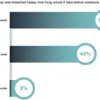

A United States Senate committee will convene Thursday to determine the future of America’s top cyber defense agency. Former Coast Guard officer Sean Plankey, President Trump’s nominee to lead the Cybersecurity and Infrastructure Security Agency, will testify before the Homeland Security and Governmental Affairs Committee. If confirmed, he won’t just inherit a title, he’ll inherit an agency in turmoil.
From aggressive Chinese cyberattacks to sweeping internal layoffs and a political crossfire threatening its very existence, CISA is at a crossroads. The stakes are high. The threats are real. And the clock is ticking.
Who Is Sean Plankey?
Plankey is no political unknown. With two decades of military service and senior cyber roles at the Department of Energy and National Security Council, he’s built a career at the intersection of infrastructure, intelligence and cybersecurity. He’s respected in both public and private sectors, particularly for his expertise in operational technology in systems such as pipelines, power grids and ports.
His resume checks all the right boxes. But stepping into the director’s chair at CISA means more than credentials. It means navigating one of the most politically charged and strategically vital agencies in the U.S. government.
What Went Wrong Before
CISA was born in 2018 out of necessity as a rising tide of cyberattacks on America’s most vital systems demanded a central agency to defend federal networks and critical infrastructure. Its first director, Chris Krebs, gained national recognition for leading efforts to secure the 2020 election. But after publicly pushing back on claims of election fraud, he was dismissed by President Trump.
Under President Biden, Jen Easterly was asked to take a broader approach. She expanded the agency’s mission to include ransomware defense, supply chain resilience and public-private coordination. CISA’s headcount grew to over 3,400 employees and its budget rose to $3.1 billion, making it a ripe target for political scrutiny and budget cuts.
But it was Easterly’s push to counter disinformation on social media, especially around elections, that drew the most controversy. Critics saw it as mission creep, arguing that the agency was drifting from its core infrastructure protection role into politically sensitive territory. Easterly defended the initiatives by pointing out that election infrastructure had been officially designated as critical infrastructure following past foreign interference attempts.
Following President Trump’s return to office in 2025, Easterly stepped down. The timing was notable just as the administration moved to cut CISA’s funding and dismantle advisory panels. The administration also laid off hundreds of CISA employees and terminated contracts supporting red team operations and election security. According to reports in The Wall Street Journal and The Register, these moves have raised concerns about the agency’s ability to meet its mission at a time when cyber threats from nation-state adversaries are escalating.
Now, CISA stands leaderless and politically vulnerable right as America’s enemies are stepping up their game.
CISA’s Mounting Crisis
The numbers are telling. The Trump 2025 budget proposal cuts CISA funding by nearly $500 million. Employees have been laid off. Veteran leadership has exited in droves. Cybersecurity professionals both inside and outside the agency are sounding alarms.
Meanwhile, China-linked adversaries operating under names like “Salt Typhoon” and “Volt Typhoon” have penetrated American telecom networks, exploiting long-ignored vulnerabilities. These are not theoretical threats. They’re live intrusions into the infrastructure that powers everything from hospitals to air traffic control.
And if that weren’t enough, the agency’s mandate is under political attack. Senator Rand Paul has floated plans to defund or dissolve CISA altogether, arguing that it has infringed on civil liberties. Department Of Homeland Security secretary Kristi Noem echoed similar criticisms, accusing the agency of silencing conservative voices under the guise of cybersecurity.
Who’s Backing Plankey?
Despite the turbulence surrounding CISA, Sean Plankey’s nomination has drawn an unusually wide and bipartisan base of support.
Michael McLaughlin, co-author of Battlefield Cyber, praised Plankey’s “deep commitment to strengthening our national security” and noted his “firsthand experience” securing critical infrastructure. Tatyana Bolton, along with the Operational Technology Cybersecurity Coalition, endorsed the nomination as well, citing Plankey’s cross-sector experience and his ability to bridge public-private divides.
A formal letter of support co-signed by the Association of U.S. Cyber Forces, Cyber Threat Alliance, McCrary Institute and others, urged the Senate to confirm him without delay. Mark Montgomery of the Cyberspace Solarium Commission called him “a great hire” with the “interagency savvy” required to navigate today’s complex threat landscape.
Even his predecessor, Easterly, lent her voice: “Sean will bring great cyber expertise, private sector creds, a warrior spirit and steady leadership to Team CISA.”
Who’s Trying To Stop Him?
The loudest opposition comes from Senator Ron Wyden, a Democrat from Oregon, who has placed a hold on the nomination, though his objection is not personal. Wyden is demanding the public release of an unclassified 2022 report that allegedly outlines years of cybersecurity negligence by major U.S. telecom companies. He accuses CISA of suppressing the report to avoid exposing systemic vulnerabilities.
Wyden argues the document is essential to understanding how Chinese threat actors gained a foothold in U.S. infrastructure and insists that Plankey’s confirmation should be delayed until the full facts are made public. While his move may not target Plankey directly, it could stall the confirmation process.
Despite the hold, Plankey’s chances remain strong. With Republican backing and industry support, a pathway to confirmation exists. But it may require compromise either through redactions or supplemental briefings to appease Wyden’s demands.
The June 5 hearing will be a pivotal moment. If Plankey performs well, momentum may shift toward a swift vote.
What Happens If He’s Confirmed?
If confirmed, Plankey must move quickly and decisively. His top priorities should include:
- Refocus The Mission: Anchor CISA back to its core: defending physical and digital infrastructure from nation-state and criminal threats.
- Rebuild Trust With Congress: Bridge partisan divides and demonstrate accountability without political entanglements.
- Harden Critical Systems Against China, Rogue Nations And Terrorist Networks: Elevate red teaming, threat intelligence sharing and industrial control system defense to counter threats not only from state actors like China but also from rogue regimes and terrorist organizations such as ISIS, which are actively recruiting and plotting within the homeland, as seen in the New Orleans terrorist attack on New Year’s Day.
- Modernize The Telecom Threat Response: Work closely with FCC, NIST and private carriers to close long-standing security gaps.
Clean Up Crew
Plankey didn’t create the challenges facing CISA but if confirmed, he’ll be tasked with stabilizing an agency under immense pressure. He brings the right combination of credentials, bipartisan support and mission clarity. But success will require more than technical know-how. It will take political finesse, steady leadership and a return to disciplined, quiet execution.
In cybersecurity, the best leaders aren’t the loudest. They’re the ones who keep the lights on and the threats out without making headlines. June 5 will tell us whether Plankey gets that chance. America’s cyber defense may hang in the balance.
If and when he is confirmed, let’s work together as an industry to make cybersecurity boring again.



